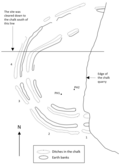Wikipedia:Today's featured article/October 18, 2022
Offham Hill is a Neolithic archaeological site and scheduled monument near Lewes, East Sussex. It was first identified as a possible causewayed enclosure in 1964; like others in England, it was enclosed with ditches interrupted by gaps, or causeways. Such enclosures may have been settlements, meeting places, or ritual sites. Offham Hill was inspected by the Ordnance Survey in 1972 and excavated by Peter Drewett in 1976. By this time, it had been badly damaged by ploughing and partially obliterated by a chalk quarry. Most finds came from the ditches, including about 7,000 worked flints, nearly 300 sherds of pottery, a human burial, other human bones, and animal remains. The site and most of the pottery were identified as Neolithic, in part by radiocarbon dating. Further ploughing after the 1976 excavation led to the effective destruction of the site. A reanalysis of the site's artefacts and human remains in 2011 confirmed a construction date in the mid-fourth millennium BC. (Full article...)

